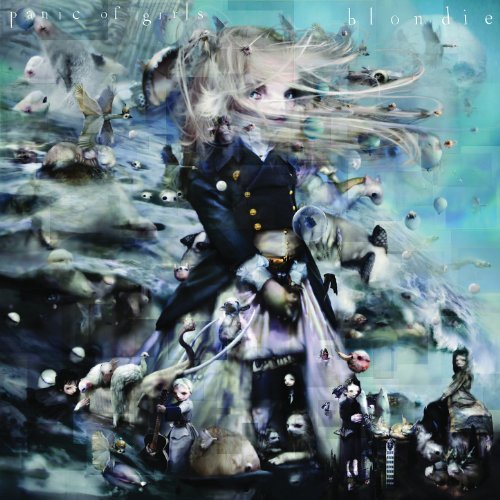
Blondie
Panic of Girls
Release Date: Sep 13, 2011
Genre(s): Pop/Rock
Record label: Eleven Seven
Music Critic Score
How the Music Critic Score works
Buy Panic of Girls from Amazon
Album Review: Panic of Girls by Blondie
Fairly Good, Based on 8 Critics
Based on rating 5/5
On Blondie's self-released ninth album, the New York new wave greats fold the present into their past – from a "Tide Is High"-tinged cover of Brooklyn avant-folkies Beirut to a "Dreaming"-like basher with a melody via TV on the Radio. There's a little too much throwing stuff at a wall (the florid Spanish house track, the Serge Gainsbourg tribute) and, oddly, their bailiwick synth-rock sometimes feels theatrically heavy-handed, more Killers than Parallel Lines. Yet, if the tunes sometimes sag, Debbie Harry's voice remains sharply sculpted; on "China Shoes" she sings about her distant lover with tough, ageless longing.
Based on rating 8.0/10
When new wave erupted on the back-end of punk, there was Blondie, all crisp beats, silent screen star peroxide beauty and a sense of ‘50s pop undertow that was equal parts innocence and pulp fiction knowing. Fronted by the soignée Deborah Harry, a former Playboy Bunny, and anchored by Chris Stein, a lean guitarist who recognized the palpable collision that was vintage pop with punk’s aggression, the band created an almost art project that blazed trails and winked at those bright enough to get that this wasn’t just another fad. The amyl nitrite-feeling soprano wielded by Harry belied that cold knife to the throat force that she actually packed, and it instilled in her an urgent, deadly desperation.
Based on rating 7/10
Delivered eight years after the reunited Blondie’s second effort, 2003’s The Curse of Blondie, 2011’s Panic of Girls rushes forth on a sleek new wave disco pulse that’s entirely unconcerned about whether ‘80s retro is in style this season or not. This is fashionable music existing outside the realm of fashion, Blondie updating their classic styles -- disco-rock, reggae-fied pop, garage bubblegum -- just enough to modernize yet not enough to be unrecognizable. Certainly, Blondie bear some signs of their age -- Debbie Harry’s voice may sound a little rough around the edges but the band also has the casual professionalism that comes from decades of play -- but this is not a nostalgia trip, something that’s evident from the new millennium paranoia of its opener, “D-Day.
Based on rating 6/10
Blondie has never been predictable. Even during periods of their greatest commercial success in the late ‘70s and early ‘80s, the group took risks. When their music did reflect prevailing pop trends, it was on their own terms. For all its mirror ball ambience, “Heart Of Glass” was an affectionate homage to the conventions of disco rather than a career-saving contrivance.
Based on rating 3/5
More showing their roots than going back to their roots, this is [a]Blondie[/a] attempting a Killers-style anthemic electro-rock makeover but with only limited success. Lead-off single [b]‘Mother’[/b], a recollection of [a]Debbie Harry[/b]’s days on the New York nightclub scene, shows their genius for big radio choruses is still very much alive and kicking.Meanwhile, [b]’D-Day’[/b] and [b]‘What I Heard’[/b] are nicely adventurous cyber-punk, on which Debbie shows upstart [a]Lady Gaga[/a] a thing or two about Warholian pop sleaze. Christ, if only the other half of this album didn’t spiral off into wretched reggae stylings, this would be alright.
Based on rating 4/10
For a band regarded as one of the most influential and best of all-time, Blondie have made a lot of mediocre and outright bad albums. A lot of fantastic singles but, if we’re being brutal, the long-playing record has not sat well with Debbie Harry and co since 1979’s Eat To The Beat. Remove ‘Rapture’, ‘The Tide Is High’ and ‘Maria’ from their post-‘Atomic’ discography and anyone would struggle to compile a convincing ‘Best Of’.
Based on rating 1.5/5
Nostalgia is a feeling that commonly arises when trying to define a musical experience. Not only is any kind of new music built up following some sort of tradition — or going against it — but the memory mechanisms always trigger resemblances, connections, and references to the history of our perceptual experience. The way we understand the musical present is mediated then by means of an idealization of a glorious, archetypical past.
Opinion: Mediocre
Flashes of inspiration aren’t enough to make for a wholly convincing return. Ben Hewitt 2011 Blondie have already survived one lengthy hiatus, emerging not only with their legacy intact but with their zeitgeist restored. Seventeen years after dwindling fan interest and a potentially fatal skin disease for guitarist Chris Stein made it seem likely that 1982’s The Hunter would be their swansong, their comeback single Maria gave them their first UK number one in nearly two decades.
'Panic of Girls'
is available now

